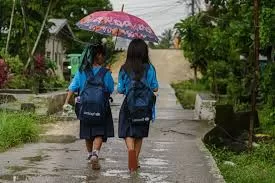WHO Departmental news

Awards were made in three categories: (i) ministries of health (or government agency under a ministry of health); (ii) ministries (or government agencies) beyond health; and (iii) non-state actors (non-governmental organization, academic institutions and philanthropy).
Ministries of health (or government agency under a ministry of health)
- The Ministry of Health, Bhutan, for the successful implementation of the Service with Care and Compassion initiative – a people-centered approach to the delivery of NCD services at the district level in Bhutan.
- The Ministry of Health, Brazil, for their leadership and outstanding contribution to multisectoral action in the prevention and control of NCDs through the Proteja Program – the national strategy to halt the rise of childhood obesity – which has been an exemplar for innovative, comprehensive intersectoral action at the local level.
- The Ministry of Health and Family Welfare, India and the Indian Council of Medical Research for the India hypertension control initiative – a highly impactful, large-scale hypertension intervention within India’s existing primary health care system.
- The E-Health Center, Kyrgyzstan, for scaling up digital health in primary care, with a particular emphasis on the prevention and control of NCDs.
- The Ministry of Health, Panama, for the successful implementation of the HEARTS package in Primary Health Care, through interdisciplinary and intersectoral actions.
- The Ministry of Health, Tunisia, in recognition of their continuous efforts and commitment to multisectoral action to prevent and control NCDs, which contributed to the adoption of large graphic health warnings on tobacco products in 2022, and the leadership of His Excellency, the Minister of Health, Professor Ali Mrabet.
- The Ministry of Health, Uganda, in recognition of their exemplary approach to driving progress on alcohol control through partnerships and multisectoral cooperation.
Ministries (or government agencies) beyond health
- Mairie de Douala, Douala City, Cameroon, for their innovative initiative to promote the health and wellbeing of the communities living in the city (including tackling NCDs and their risk factors), based on civic engagement, participative and multisectoral approaches for good governance to become a healthy city.
Non-state actors (non-governmental organization, academic institutions and philanthropy)
- Reconciliation and Development Association, Cameroon, for their achievements in the prevention and control of NCDs in Cameroon, by providing a multisectoral platform, engaging youth, and leading advocacy actions at the community and national level.
- The Eastern Mediterranean Public Health Network (EMPHNET), Jordan, for their achievements in strengthening provision of NCD services at the primary healthcare level, across countries in the Eastern Mediterranean Region, including by promoting greater multisectoral coordination of the NCD response for Jordan citizens and for refugee populations.
- Karagheusian Association for Child Welfare, Lebanon, for providing and scaling up high quality, safe, comprehensive, integrated, accessible, available and affordable primary healthcare services, including around NCD screening and control and mental health and psychosocial support in Lebanon.
- Lesotho-Boston Health Alliance, Lesotho, in recognition of the achievements on strengthening Lesotho’s health system, by providing context-specific primary health care training for healthcare providers at the community level.
- Moroccan League for the Fight against Diabetes, Morocco, for their key role in raising awareness and building capacity around the prevention and control of diabetes, which contributed to the adoption of a tax on sugary drinks in Morocco.
- European Forum for Primary Care, The Netherlands, for providing an exemplary platform for primary health care professionals to collaborate and jointly strengthen action across Europe, including advocating for ever stronger, fairer and equitable primary care.
- Rwanda NCD Alliance, Rwanda, in recognition of encouraging ever greater multisectoral collaboration on NCDs in Rwanda, including supporting the establishment of the National NCD Multisectoral Coordination Committee, and by assisting the Government implement the National NCD Strategy.
- Arogya World, USA, for scaling up community-based delivery models to strengthen prevention and control of diabetes at the population level, across 19 states in India.
- The NCDI Poverty Network, USA, in recognition of their global contribution to generate data, implement programmes, foster multisectoral partnerships, and raise awareness to prevent and reduce the death and suffering of those doubly affected by extreme poverty and NCDs and injuries.
- Primary Care International, UK, for their technical and advocacy support to promote integrated primary healthcare across the world, by adapting NCD-related normative guidance, as well as by promoting multisectoral partnerships to strengthen primary health care and tackle NCDs.











